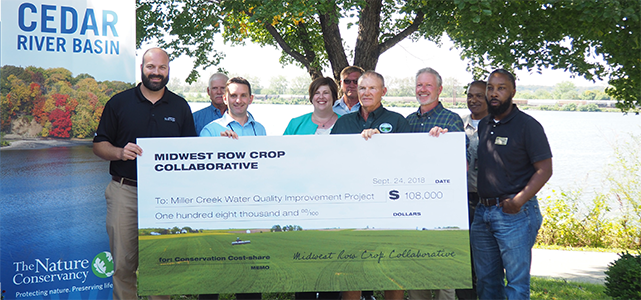The Miller Creek Challenge
Successfully Surpassing A Fundraising Goal of $100,000
The Miller Creek Water Quality Improvement (WQI) project in Black Hawk County has been extremely successful in scaling up water quality practices.
In fact, in 2017, the project ran out of funds to cover the unusually high farmer demand for conservation practices.
The Miller Creek Challenge was created to address the funding needs of the watershed project. The Challenge conveyed the sense of urban-rural responsibility for water quality with a theme of: “It’s Our Soil. It’s Our Water. It’s Our Future.”
The Iowa Agriculture Water Alliance (IAWA) pledged an initial contribution of $13,500 to the Miller Creek Challenge to cover half of the 2017 cost-share deficit for cover crops and challenged the WQI to seek additional funding.
“We wanted to help maintain the great momentum that the Miller Creek project had sparked for increasing farmer demand for conservation practices,” says Sean McMahon, Executive Director of IAWA. “This is a great example of how public-private partnerships will help us meet the goals of the Iowa Nutrient Reduction Strategy (NRS).”

A $108,000 donation from the Midwest Row Crop Collaborative (MRCC) helped the Miller Creek WQI complete its fundraising goal in less than a year. Together with other private donations, the WQI raised $124,000 for additional anticipated need for cost-share for conservation practices in the watershed for three years. These dollars supplement local, state, and national cost-share funds.
Focused Funding
The Miller Creek WQI, led by the Black Hawk Soil and Water Conservation District, is part of the Middle Cedar Watershed, which is a priority watershed for the MRCC.
The Nature Conservancy (TNC) is one of three non-profits involved in the MRCC, along with nine corporations. “As an organization with dedicated ‘boots on the ground’ in the Cedar River Watershed and a reputation for collaboration, TNC was excited to be able to connect the MRCC’s efforts to work in the Cedar River Watershed and this ambitious effort,” says Kristin Aschenbrenner, State Director for TNC.
Larry Clemens, North American Agriculture Program Director for TNC, adds, “TNC is pleased to be a partner and in this case an agent between the MRCC and local conservation leaders. The MRCC is performing a critical function in assisting with implementation of conservation practices that work for farmers and a sustainable food system. Their leadership through their actions is greatly appreciated.”
A Community of Support
With a watershed approach to improving water quality, all stakeholders in a community work together collaboratively towards common goals. The community in the Miller Creek watershed is working to improve water quality, reduce flood risk, and build soil health.
Leonard Youngblut is one of the farmers who has been part of the WQI from the start and serves on the Miller Creek Advisory Council. “I do my best to conserve and preserve our incredibly rich Iowa soil,” he says. “It’s going to take contributions from all of us to meet Iowa’s Nutrient Reduction Strategy (NRS). We thank all the partners who help us along the way. We are going to keep moving the needle in Miller Creek.”
Another leader in the watershed, Louis Beck, a third-generation farmer, echoes this sentiment. Earlier this year, he said, “I believe that the whole water quality issue is a shared issue. The Miller Creek Watershed starts in my land. I feel responsible that if I’m part of it at the beginning, I need to do what I can to reduce nitrate and to reduce soil erosion, so I am definitely a part of the solution.”
Besides adding value to the corn and soybeans that grow in the region through its manufacturing economy, the City of Cedar Rapids believes in the shared responsibility to improve both water quality and to address water quantity. “Through our close work with many partners in the watershed, we’ve learned the most effective way to address the challenges we face is to build one-on-one relationships with people committed to and invested in water quality and managing water quantity,” says Steve Hershner, Utilities Director, City of Cedar Rapids.
“It’s exciting to see the success of this unique approach to bring in additional funding,” concludes Mike Naig, Iowa Secretary of Agriculture. “We thank IAWA, the MRCC, and all the private individuals that have supported this challenge and helped it meet and surpass its original goal.”